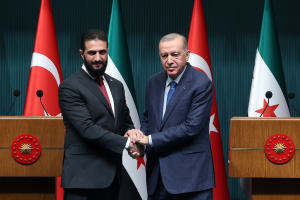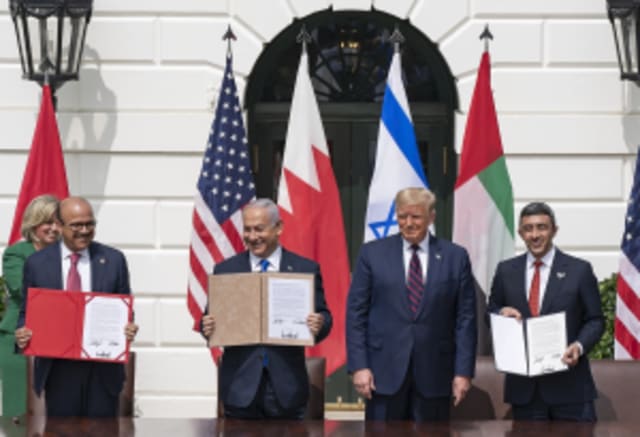‘Both countries are close friends’: Azerbaijan hosts first high-level meeting to calm Israel-Turkey tensions in Syria
Deconfliction talks follow Israeli strike on Syrian airbase sought by Turkey

Israeli and Turkish representatives met in Azerbaijan on Wednesday, in a first high-level meeting aimed at easing escalating tensions between the two nations' armed forces in Syria.
Last week, Israel Defense Forces struck several military sites in Syria, including the Hama Air Base and the Tiyas Airbase (T4), which Turkey was reportedly preparing to take control of.
Following reports that Israel and Turkey initiated talks aimed at setting up a deconfliction channel to prevent unwanted clashes between their forces, Azerbaijani President Ilham Aliyev announced on Wednesday that his country would help the two nations reach an agreement.
The IDF engaged armed Syrians during an Israeli incursion 13 kilometers into Syrian territory near Nawa, Daraa Province, on April 2. (5/6) pic.twitter.com/ML0B1qruG0
— Critical Threats (@criticalthreats) April 3, 2025
"A diplomatic-security delegation, led by National Security Council Director Tzachi Hanegbi, and with the participation of senior representatives from the Defense Ministry and the security services, met last night with a parallel Turkish delegation," Israel's Prime Minister's Office (PMO) stated on Thursday.
"Israel thanks Azerbaijan and President Ilham Aliyev for hosting the important talks. Each side presented its interests in the region. It was agreed to continue on the path of dialogue in order to maintain regional stability."
Speaking at the annual ADA University Policy Forum in Baku on Wednesday, Aliyev expressed his country’s interest in contributing to a resolution.
“Both countries are close friends of Azerbaijan. With Turkey, we are allies, and Israel is a friendly state to Azerbaijan, and over many years, this mutual friendship has been proven in difficult times for both of us,” Aliyev said. “Therefore, this tension between the two countries is very troubling and a matter of concern for us.”
He claimed that his government played a role in ending the previous period of tension between Israel and Turkey, which paved the way for Israeli President Isaac Herzog’s official visit to Turkey in 2022.
Aliyev said that, despite legitimate concerns, he hopes to find “areas of mutual interest.”
“It is always bad when your friends have poor relations; it is bad for them, bad for us, and bad for the world. I believe that despite legitimate concerns and the relatively high level of mistrust, it is still possible to find a basis for normalization and areas of mutual interest.”
On Thursday morning, the Turkish news site The Daily Sabah reported that Israeli and Turkish officials held their first deconfliction meeting in Azerbaijan on Wednesday, citing sources in the Turkish Defense Ministry.
“The first technical meeting [was] held Wednesday in Azerbaijan to discuss a conflict prevention mechanism between Türkiye and Israel to avoid unwanted incidents in Syria,” the sources said.
According to the sources, Turkey called on Israel to “immediately halt provocative attacks that threaten Syria's territorial integrity and destabilize its security.”
They said that Turkey also accused Israel of “expansionist” behavior, saying the international community should do more to stop Israeli “unlawfulness.”
On Thursday, sources in the Turkish Ministry of Defense told the Saudi al-Arabiya channel, "Our presence in Syria is not intended to harm a third country. We told Israel that our presence in Syria is at the request of Damascus in order to increase Syria's defense capabilities to deal with terrorism."
An Israeli government official confirmed the meetings in Azerbaijan on Thursday, briefing media outlets, saying that a Turkish military presence in the Palmyra area of Syria, where the T4 airbase is located, was a “red line” for Israel.
“Yesterday, a meeting was held between representatives from Israel and Turkey in Azerbaijan, where Israel made it clear unequivocally that any change in the deployment of foreign forces in Syria – and in particular the establishment of Turkish bases in the Palmyra area – is a red line and will be considered a breaking point,” the official stated.
The official added that Israel has made its position clear: addressing this threat is the responsibility of the new government in Damascus.
“Any action that endangers Israel will endanger the rule of [Syrian President Ahmad] al-Sharaa,” the official stated.
An Israeli security source later told Sky News Arabic that Israel does not want to see Turkish forces deployed along the Golan border.
However, the source added that Turkey is not seeking a confrontation, and that the IDF has not received any orders to actively engage with Turkish forces in Syria.
Israel and Turkey have been verbally sparring over their respective roles in Syria following the fall of the Assad regime in December 2024, which was brought about by Turkish-backed groups such as Hay’at Tahrir al-Sham.
While Turkey has criticized Israeli strikes and the seizure of a security buffer zone in the Mount Hermon area, Turkey previously seized hundreds of kilometers of territory in northern Syria, both during and after the Syrian Civil War.
Israel struck several sites in Syria where the Turkish military reportedly sought to establish bases for its forces in the area, including the T4 airbase near Homs.
Despite the evident differences in positions reflected in statements from both sides, one Turkish official stated, “Efforts will continue to establish this mechanism.”

The All Israel News Staff is a team of journalists in Israel.
You might also like to read this:

















